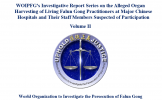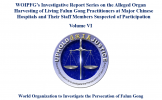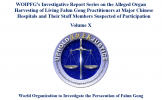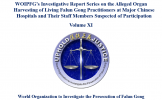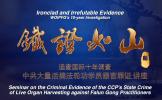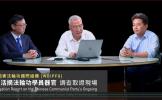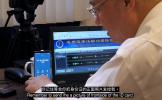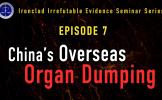WOIPFG’s Investigative Report on the Alleged Organ Harvesting of Living Falun Gong Practitioners at the PLA Eastern Theater General Hospital (Formerly Nanjing General Hospital of Nanjing Military Command) and Its Staff Members Suspected of Participation
Address: 1 Shuanglong Street, Yuhuatai District, Nanjing City, Jiangsu Province, China
Foreword
As early as 2001, chaired by Li Leishi, an academician of the Chinese Academy of Engineering, the three doctors on duty at the Institute of Nephrology of the PLA Eastern Theater General Hospital (formerly Nanjing General Hospital of Nanjing Military Command), already "performed hundreds of kidney transplants in a year". It’s clear that the number of kidney transplants in the Institute was already remarkable by then. In 2004, the hospital became one of the largest kidney transplant centers in China. In the same year, it was awarded the Collective First-class Merit by the CCP. The hospital was the first military hospital of the Communist Party of China to participate in live organ harvesting of Falun Gong practitioners. It was rewarded by Jiang Zemin's Central Military Commission for its outstanding performance in kidney transplantation. The hospital is suspected of killing many people by doing kidney transplants for Jiang Mianheng, the son of Jiang Zemin, and the family members of Meng Jianzhu, secretary of the Central Political and Legal Committee. The weird thing is, Academician Li Leishi (84 years old), who performed kidney transplantation for the family members of the above-mentioned high-level CCP, committed suicide by jumping off the building on March 16, 2010. In view of the background of the CCP’s national crime of live organ harvesting, the hospital is suspected of participating in the crime of live organ harvesting from Falun Gong practitioners and other groups.
I. The Hospital Overview
The former Nanjing General Hospital of the Nanjing Military Command is a large-scale 3rd level first class comprehensive hospital of the Chinese People's Liberation Army. It was renamed the General Hospital of the Eastern Theater Command in November 2018.
The hospital has more than 4,000 employees, including 2 academicians of the Chinese Academy of Engineering, 448 highly educated personnel on duty, 445 experts with senior professional titles, and 532 graduate students.
The hospital covers an area of more than 1,400 mu and has 2,000 beds. The hospital has 52 departments, including 1 national key discipline, 1 national clinical medical center, 1 national drug clinical trial institution, 2 military disciplines, 4 military medical research institutes, 2 key laboratories of the army, etc.[1]
II. The hospital has established the Army Kidney Transplant Research Institute
The nephrology laboratory established under the leadership of Li Leishi, an academician of the Chinese Academy of Engineering, was approved as the key laboratory of nephrology in the army in 1997. It was listed as the "Top Priority" discipline of the army in 2000. The hospital established the first "Nephrology Translational Medicine Research Center" in China in 2011. On the list of the "Best Specialty Ranking of Chinese Hospitals" released in March 2011, the Institute of Nephrology of the Nanjing General Hospital of the Nanjing Military Command ranked Number 1[2].
The Nephrology Institute of Nanjing General Hospital of Nanjing Military Command has specialized outpatient clinics, clinical treatment centers, kidney biopsy diagnosis centers, blood purification centers, peritoneal dialysis centers, kidney transplantation centers, renal intensive care units (RICU), and stem cell transplantation wards and Key Laboratory of Nephrology. The institute has four major brand technologies that are renal biopsy technology, renal pathological diagnosis technology, blood purification technology and kidney transplantation technology[3].
In 2011, Academician Liu Zhihong was elected as a Director of the International Society of Nephrology (ISN), and represented China in participating in the work of the Kidney Disease Global Promotion Committee (KDIGO) to guide the development of global guidelines for kidney disease treatment. He was officially appointed as an adjunct professor by Brown University in the United States. The Institute has communicated at international academic conferences for many times, and has won the Young Scholar Award issued by the American Transplantation Conference for many years. As early as 1997, the Institute established sister units with John Hopkins University School of Medicine and Brown University School of Medicine, and began frequent academic exchanges and scientific research cooperation. In recent years, it has established a sister unit with the University of Washington in the United States to further expand external relations and cooperation[4].
III. The hospital has a strong kidney transplant team and a large number of transplants
1. Li Leishi alone performed 120 kidney transplants every year. In December 2008, Li Leishi published a paper titled "Organ Donation after Death Theoretically Exists, but is Difficult to Realize"[5] in China, saying: "There is a large shortage of organ transplant donors, because we are a research institute, so the number of operations performed was Not a lot, but I used to perform kidney transplants on 120 patients a year."
2. Three doctors performed hundreds of kidney transplants in a year
In the "Interview with Academician Li Leishi"[6] published by "China Military Network", it mentioned that in 2001, a medical accident occurred in the institute, and Li Leishi dismissed three doctors on duty. He said they "do hundreds of kidney transplants in a year". From Li Leishi's point of view, even if they were dismissed, it only "reduced a few kidney transplants in the second year".

Figure 1 Snapshot of an article on China Military Network
Based on this, it can be seen that as early as 2001, the three doctors who were only on duty for one day in Li Leishi's Institute of Nephrology had already "performed hundreds of kidney transplants a year." So how many doctors and experts are there in the Army Institute of Nephrology? If calculated in this way, what would be the total number of kidney transplants performed by the PLA Kidney Institute in 2001?
3. With a large number of kidney transplant doctors, multiple kidney transplant teams can be formed.
WOIPFG released the list of transplant doctors in the hospital in 2014. There are nearly 30 kidney transplant specialists in the hospital, including 11 chief surgeons[7], 8 associate professors, 5 doctoral supervisors, 14 master supervisors, successively trained 69 doctoral candidates, 80 master candidates, and 10 postdoctoral[8]. Multiple kidney transplant teams can be formed.
IV. The Army Institute of Nephrology, which is engaged in kidney transplantation, has a large number of beds and extremely short time of hospital stays
The Army Kidney Disease Research Institute of Nanjing Military Command General Hospital has a clinical treatment center with 210 beds[9]. For a clinical specialty with 210 beds, the average length of stay in the institute is 9 days, which is significantly shorter than that of the same specialty in the same level hospitals[10]. The average length of hospital stay was shortened from 13.4 days in 2008 to 8.22 days in 2009, and the number of hospitalized patients increased from less than 4,000 cases per year in 2001 to nearly 7,000 cases per year in 2016[11].
V. The Institute of Nephrology of the PLA is listed as a "Top Priority" research institute by the CCP
In 2007, the CCP military stated in the "Decision to Learn from Li Leishi": "Li Leishi built the first Department of Nephrology in the army in 1979, with the 10,000-yuan start-up funds allocated by the hospital and only "two and a half" doctors. Two years later, he advocated the establishment of the National Society of Nephrology. In the past, kidney transplantation was a surgical operation. As a surgeon, he stepped into the field of kidney transplantation under pressure and criticism and achieved success. The number of cases has grown from a dozen to more than 100, becoming one of the largest kidney transplant centers in China, and by 2004, the number of kidney transplants exceeded 1,000 cases." [12]
It’s clear that the CCP attaches great importance to the achievements in the field of transplantation, because Li Leishi has outstanding achievements in the field of kidney transplantation, so CCP issued a "Decision to learn from Li Leishi"[13]. In 2000, the Institute of Kidney Diseases of the General Hospital of Nanjing Military Command was listed as a "Top Priority" research institute[14] by the Central Military Commission of the Communist Party of China. In 2004, the research institute was awarded the Collective First-class Merit by the CCP[15].
Li Jieshou, who led the completion of the first allogeneic small intestine transplantation in Asia in 1994, and the first combined liver and intestine transplantation in April 2003, is the pioneer of small intestine allograft transplantation in Asia. Li Jieshou is in charge of the Military General Surgery Institute, consist of 12 clinical medical research groups including transplantation[16]. In 2020, Academician Li Jieshou of the General Hospital of the Eastern Theater Command was awarded the Victory Medal of Honor by the Central Military Commission[17].
VI. The Army Institute of Nephrology and the Army Institute of General Surgery made huge incomes
According to a Financial News report on April 22, 2015, the revenue of the hospital increased from more than 200 million yuan to 500 million yuan in 2004, and the number of kidney transplants performed by the Institute of Nephrology exceeded 1,000 cases in 2004[18]. Among the list of the best hospitals in China, Nanjing General Hospital had entered the list for five consecutive years. In the 2013’s annual list released in November 2014, Nanjing General Hospital ranked 29th, and its nephrology department ranked second in the country[19]. According to a 2007 "China Military Network" report, Li Jieshou was in charge of the Military General Surgery Research Institute, formed 12 clinical medical research groups including transplantation, with 208 beds, an annual admission capacity of more than 5,000 patients, and an annual income of nearly 100 million yuan[20].
VII. The hospital made a blatant falsification about the amount of kidney transplants
At the time of 2004, the institute was awarded the Collective First-class Merit for breaking a thousand cases of kidney transplantation, which indicated that there were very few hospitals that performed thousands of kidney transplants at that time. According to the CCP “Journal of Armed Forces Medicine”, Volume 15, Issue 6, June 2004, published by Yu Lixin of the Organ Transplantation Center of Southern Hospital of the First Military Medical University, "Progress of Clinical Allogeneic Kidney Transplantation in the country"[21], it can be seen that as early as in the year of 2000, there were already many transplant centers in mainland China with more than 1,000 kidney transplants. See the table below:
Figure 2. Overview of some transplantation centers in China with more than 1,000 cases of kidney transplantation
The above hospitals were only a part of the list. Among them, PLA General Hospital and Guangzhou Southern Hospital (Southern Hospital of the First Military Medical University) are both military hospitals. In addition, Xinqiao Hospital of the Third Military Medical University of the PLA, which is also a military hospital, claimed in its hospital qualification document "A Brief History of Urology in the Kidney Disease Center of the Army" [22]page 157: "As of 2002, 2,590 cases of kidney transplantation have been performed." Moreover, we also found that in November 2004, the CCP's official media "Guangming Net" reported that "Beijing Friendship Hospital Exceeds 3,000 cases of kidney transplantation." [23]
From 2000 to 2004, it was a period of great development of organ transplantation in the CCP. However, the Institute of Kidney Diseases of the General Hospital of the Nanjing Military Command, which was regarded as the "Top priority" by the CCP military, did not improve its performance in organ transplantation until 2004, and only reached the lower level of other military hospitals 4 years ago. With such a level, how could it be awarded the Collective First-class Merit by the CCP in 2004?
In addition, the official website of the hospital stated that the kidney transplant center performs nearly 100 kidney transplants a year[24], which is even more public fraud. In December 2008, Li Leishi claimed: "In the past, I could perform kidney transplant operations on 120 patients every year." [25] Li Leishi's annual kidney transplant operations alone exceeded the hospital's declared number of operations. Moreover, when Li Leishi dealt with the three doctors who had medical malpractice in 2001, he said that these three doctors performed hundreds of kidney transplants a year. [26]
VIII. Telephone Investigation
Investigation Subject: Kidney transplant nurse at Nanjing General Hospital of Nanjing Military Command[27]
Investigation time: September 11, 2017 (Phone# 86-2580860017)
Summary
1. More than one hundred cases in a year.
2. Have done quite a lot this year, roughly a few dozens of them.
3. Just two directors do it, one is director Chen Jinsong, and the other is director Cheng Dongrui.
4. The situation of the donor is not clear, because we don’t know it ourselves, understand?
(Recording 1. Download: MP3; Transcript Download: pdf 1)
Ⅸ. The hospital is suspected of killing in order to find live donors for Jiang Mianheng and Meng Jianzhu's family members
According to Guo Wengui, a wealthy businessman in exile in the United States, who exposed to the media in 2017, Jiang Mianheng (the eldest son of Jiang Zemin) had three kidney transplants and killed five people; Meng Jianzhu (Secretary of the Central Political and Law Commission) had his mother's kidney transplanted and killed prisoners for their organs. Guo Wengui said that Li Leishi, vice president of the General Hospital of the Nanjing Military Command, was the doctor who did the kidney transplants for Jiang Mianheng and Meng Jianzhu's family member. On March 16, 2010, 84-year-old Li Leishi committed suicide by jumping off a building[28].
Ⅹ. Major Responsible Persons:
DZQZYY001 Liu Zhihong,
Job Title: Academician of the Chinese Academy of Engineering. Currently the Dean of Nanjing University School of Medicine, deputy director of Nanjing General Hospital of Nanjing Military Region, Director of the PLA Kidney Disease Research Institute, Director of the PLA Kidney Disease Key Laboratory, professor and doctoral supervisor of Nanjing University and the Second Military Medical University.
Personal Profile: Visiting professor at Brown University School of Medicine; Council member of International Society of Nephrology (ISN), Executive member of Kidney Disease: Improving Global Outcomes (KDIGO), International CRRT committee member. Chief scientist of the National "973" Project. Council member of the Chinese Medical Association, Director of the Nephrology Society of the Chinese Medical Association, Vice Chairman of the Ninth Army Medical Science and Technology Committee, Chairman of the Internal Medicine Field Committee, Vice President of Jiangsu Medical Association, Vice Chairman of Jiangsu Science and Technology Association, Chief Editor of Chinese Journal of Nephrology, Associate Editor of Am J of Kidney Dis, Editorial Board Member of European Journal of Kidney and Blood Pressure Research. [29]
DZQZYY002 Li Jieshou
Job Title: Vice President of Nanjing General Hospital, Director of General Surgery, Director of General Surgery Institute of the Army
Personal Profile: Born in October 1924, started to work in April 1949, joined the army in April 1963, became the CCP member in March 1979. Vice president of Nanjing General Hospital, Director of general surgery, director of general surgery institute of the army, professional technology Level 1, elected as an academician of the Chinese Academy of Engineering in 1996. On March 12, 1994, successfully performed the first "human small intestine allograft" in Asia. After that, he took the lead in clinical application of total intravenous nutritional therapy in China, and successively completed the first "combined liver and intestine transplantation" and "parental donor intestine transplantation" in Asia. When Li Jieshou led the establishment of the Intestinal Fistula Treatment Group in 1971, there were only four beds. It became the Army’s Abdominal Surgery Specialist Center in 1979. Upgraded to the Army’s General Surgery Research Institute in 1995, consist of 12 clinical departments for intestinal fistula, transplantation, and nutritional support etc., with 208 beds, and more than 5,000 annual admission capacity, a cure and improvement rate of 99.2%, and an annual income of nearly 100 million yuan. It has become a key discipline of the country, the army, and Jiangsu Province, a doctoral and master's degree authorization point of Nanjing University, and the Ministry of Health Clinical Pharmacology Base, Army Key Laboratory of Gastrointestinal Surgery. [30]
DZQZYY003 Ji Shuming
Job Title: Professor of Nephrology, Chief Surgeon. Currently served as the deputy Director of the Institute of Nephrology, General Hospital of the People's Liberation Army of Nanjing Military Command, and an associate professor at the School of Clinical Medicine of Shanghai Second Military Medical University.
Personal Profile: Performed nearly 800 kidney transplants in the past 8 years. Specialized in donor kidney preservation, treatment, kidney transplantation, etc.[31]
DZQZYY004 Chen Jinsong
Job Title: Director of Kidney Transplant Center, Associate Chief Surgeon.
Personal Profile: engaged in the clinical and scientific research of kidney transplantation for nearly 20 years, and performed hundreds of kidney transplantation cases. [32]
DZQZYY005 Chen Huiping
Job Title: Professor of Nephrology, Chief Surgeon.
Personal Profile: Member of the Chinese Medical Association and the Organ Transplantation Professional Committee of the Army. Went to Singapore General Hospital (1992-1993) and the University of Colorado (1999) for training. Became student of Academician Li Leishi since the early 1980s; engaged in clinical and pathological diagnosis of kidney diseases under the guidance of Academician Li. [33]
DZQZYY006 Wen Jiqiu
Job Title: Associate Chief Surgeon of Nephrology
Personal Profile: Studied clinical medicine at Xiangya Medical College in 1992; admitted to Sun Yat-Sen University School of Medicine in 2000, major in nephrology; admitted to Nanjing University School of Medicine in 2005 to study for a doctorate. Under the tutelage of academician Li Leishi and academician Liu Zhihong, the famous nephrologists. Received a doctorate degree in medicine in 2008, then engaged in kidney transplantation and kidney disease diagnosis and treatment in the General Hospital of Nanjing Military Command. The main direction is the diagnosis and treatment of renal transplant rejection and renal disease recurrence after renal transplantation, especially in the diagnosis and treatment of various medical complications and renal transplantation after renal transplantation. [34]
DZQZYY007 Cheng Dongrui
Job Title: Attending Surgeon of Nephrology.
Personal Profile: College graduated from the Department of Clinical Medicine, Second Military Medical University, and master graduated from Nanjing University School of Medicine. Has been engaged in kidney transplantation work in the Nephrology Institute of the General Hospital of Nanjing Military Command for nearly 7 years. Responsible for the biopsy of transplanted kidneys in the Kidney Transplantation Center of the Institute, and has a certain research experience on the pathology of kidney transplantation.[35]
DZQZYY008 Zeng Caihong
Job Title: Associate Professor, Associate Chief Surgeon.
Personal Profile: Graduated from Nanjing University School of Medicine, majoring in clinical medicine, has long been engaged in the research of renal pathology, renal transplantation pathology, renal ultrastructure, clinical-pathological and pathogenesis of renal diseases, and has accumulated diagnostic experience based on nearly 20,000 cases of renal biopsy specimens so far. In 2009, he went to visit UT Southwestern Medical Center (Professor Zhou Xinjin) and Vanderbilt University Medical Center (Professor Fogo) and studied in the Renal Pathology Branch of the Department of Pathology. Specialized in Kidney transplant surgery and the use of immunosuppressants for kidney transplantation, diagnosis and treatment of acute and chronic rejection. [36]
DZQZYY009 Gao Jianping
Job Title: Chief Surgeon of Nephrology, Member of the Army Urology Professional Group, Leader of the Nanjing Military Command Urology Academic Group
Personal Profile: Born in January 1953. Graduated from the Third Military Medical University in October 1973, and graduated from Shanghai Second Medical University in July 1988 with a master's degree. Presided over the development of kidney transplantation and other work. Pathological diagnosis of acute and chronic rejection of kidney transplantation.[37]
DZQZYY010 Li Ning
Job Title: Director of General Surgery, Chief Surgeon, Professor
Personal Profile: Started the animal experimental research of small intestine transplantation in 1988, successfully established rat and pig small intestine transplantation models in 1992. Performed cutting-edge research on transplantation techniques, immune rejection monitoring and treatment, perioperative management, recovery and evaluation of transplanted intestine function, etc., successfully completed the first clinical small intestine transplantation in Asia in 1994, which was one of the nine countries that could perform small intestine transplantation in the world at that time., successfully completed the first combined liver and small intestine transplantation in Asia in 2003. Responsible for undertaking the "Eleventh Five-Year" national science and technology support project, the research results and innovative technologies related to small intestine transplantation have been promoted and applied.[38]
DZQZYY011 Yu Wenkui
Job Title: Chief Surgeon of General Surgery, Professor, Doctoral Supervisor
Personal Profile: Visiting scholar in the Center for General Surgery, Visceral and Liver Transplantation of Chariet Medical School in Berlin, Germany from December 2008 to December 2009.[39]
DZQZYY012 Jing Hua
Job Title: Director of Cardiothoracic Surgery, Chief Surgeon.
Personal Profile: Member of the National Organ Transplantation Committee. Editorial board member of Chinese Journal of Organ Transplantation. Born in 1951, graduated from the Fourth Military Medical University in 1983 with a master's degree in medicine, studied in Cardiac Surgery, University of Pittsburgh School of Medicine, Pennsylvania, USA, from August 1988 to October 1990. Performed the first allogeneic orthotopic heart transplantation in the army in 1994. Has extensive experience in surgical treatment of congenital and acquired heart disease and transplantation immunity. [40]
DZQZYY013 Hu Xiaonan
Job Title: Chief Surgeon of Cardiothoracic Surgery
Personal Profile: Graduated from the Second Military Medical University with a master's degree in medicine. Actively participate in and preside over the diagnosis, operation, rescue or monitoring of various difficult and complicated diseases in the department, such as heart transplantation, etc. [41]
DZQZYY014 Huang Zhenping
Job Title: Director of Ophthalmology, Professor, Chief Surgeon. Good at corneal transplant.[42]
DZQZYY015 Xue Chunyan
Job Title: Deputy Director of Ophthalmology, Associate Chief Surgeon. Youth member of the Army Ophthalmology Professional Committee.
Personal Profile: Engaged in ophthalmology clinical, scientific research and teaching for more than 10 years, especially focusing on the research and treatment of various corneal diseases, corneal transplantation and other anterior segment diseases.[43] Skillful at various corneal transplant operations.
DZQZYY016 Chen Suihua
Job Title: Professor of Ophthalmology, Chief Surgeon.
Personal Profile: Admitted to the Medical Department of the First Military Medical University in 1978. Engaged in ophthalmology clinical work for nearly 30 years, skillful at corneal transplant operations and basic research[44].
DZQZYY017 Li Yousheng
Job Title: Chief Surgeon of General Surgery, Professor.
Personal Profile: Member of the Scientific Committee of the International Intestine Transplant Association (8 members in total, the only one outside the United States and Europe), deputy director of the Pancreatic and Small Intestine Transplantation Group of the Organ Transplant Branch of the Chinese Medical Association, member of the Standing Committee of the Organ Transplantation Branch of the Chinese Medical Doctor Association, member of the Standing Committee of the General Surgery Committee of the Army and head of the Trauma Group, member of the Organ Transplantation Committee of the Army, and member of the Transplant Immunology Committee of the Chinese Society of Immunology. Selected as one of the first batch of "135 Project" key talents trained by the Jiangsu Provincial Department of Health in 2001. Selected as a leading medical talent in Jiangsu Province in 2006[45]. Skillful at small intestine transplantation and combined abdominal multi-organ transplantation.
DZQZYY018 Ni Xiaodong
Job Title: Attending Surgeon of General Surgery. Skillful at small intestine transplantation, multi-organ transplantation in the abdominal cavity[46].
References:
[1] Website baike.baidu.com, General Hospital of the Eastern Theater Command of the Chinese People's Liberation Army
https://baike.baidu.com/item /23136268?fromtitle= &fromid=4160746
[2] Official Website of Nanjing General Hospital of Nanjing Military Command, Institute of Nephrology
[3] Website haodf.com, General Hospital of Nanjing Military Command, Introduction to Nephrology
http://www.haodf.com/faculty/DE4rO-XCoLUnQ3sFh7UcoLDoWk/jieshao.htm
WOIPFG Archived Link:
http://www.zhuichaguoji.org/sites/default/files/report/2016/64700_06901…
[4] Official Website of Nanjing General Hospital of Nanjing Military Command, Institute of Nephrology
[5]Website Health.sohu.com, Organ Donation after Death Theoretically Exists, but is Difficult to Realize, Li Leishi, November 27, 2008.
http://health.sohu.com/20081127/n260870584.shtml
WOIPFG Archived Link:
http://www.zhuichaguoji.org/cn/images/nationalcriminalreports/1066.png
[6]China Military Network, chinamil.com, Interview with Academician Li Leishi https://web.archive.org/web/20130606082614/http://www.chinamil.com.cn/s…
WOIPFG Archived Link:
http://www.zhuichaguoji.org/cn/images/nationalcriminalreports/1069.png
[7] WOIPFG Releases the List of 2, 096 Medical Personnel in 103 Chinese Military and Armed Police Force Hospitals Suspected of Harvesting Organs from Living Falun Gong Practitioners, October 28, 2014.
http://www.zhuichaguoji.org/node/45100#_Toc401944927 (Chinese)
https://www.upholdjustice.org/node/282 (English)
[8] Website haodf.com (Good Doctors Online), General Hospital of Nanjing Military Command, Introduction to Nephrology
http://www.haodf.com/faculty/DE4rO-XCoLUnQ3sFh7UcoLDoWk/jieshao.htm
[9] Website haodf.com (Good Doctors Online), General Hospital of Nanjing Military Command, Introduction to Nephrology
http://www.haodf.com/faculty/DE4rO-XCoLUnQ3sFh7UcoLDoWk/jieshao.htm
[10] Website haodf.com (Good Doctors Online), General Hospital of Nanjing Military Command, Introduction to Nephrology
http://www.haodf.com/faculty/DE4rO-XCoLUnQ3sFh7UcoLDoWk/jieshao.htm
[11] Official Website of Nanjing General Hospital of Nanjing Military Command, Institute of Nephrology
[12] China Military Network, Decision on learning from Comrades Li Jieshou and Li Leishi
https://web.archive.org/web/20130606081811/http://www.chinamil.com.cn/s…
WOIPFG Archived Link:
http://www.zhuichaguoji.org/cn/images/nationalcriminalreports/1065.png
[13] China Military Network, Decision on learning from Comrades Li Jieshou and Li Leishi
https://web.archive.org/web/20130606081811/http://www.chinamil.com.cn/s…
WOIPFG Archived Link:
http://www.zhuichaguoji.org/cn/images/nationalcriminalreports/1065.png
[14] Xinhua Net, Institute of Military Nephrology
http://news.xinhuanet.com/mil/2009-06/03/content_11479483.htm
WOIPFG Archived Link:
http://www.zhuichaguoji.org/cn/images/nationalcriminalreports/598.png
[15]Website haodf.com, General Hospital of Nanjing Military Command, Introduction to Nephrology http://www.haodf.com/faculty/DE4rO-XCoLUnQ3sFh7UcoLDoWk/jieshao.htm
[16] China Military Network, Decision on learning from Comrades Li Jieshou and Li Leishi https://web.archive.org/web/20130606081811/http://www.chinamil.com.cn/s…
[17]Website of Nanjing University, Big News! Academician Li Jieshou of the General Hospital of the Eastern Theater Command was awarded the Victory Medal of Honor by the Central Military Commission. June 28, 2020.
[18]China Military Network, Decision on learning from Comrades Li Jieshou and Li Leishi
https://web.archive.org/web/20130606081811/http://www.chinamil.com.cn/s…
WOIPFG Archived Link:
http://www.zhuichaguoji.org/cn/images/nationalcriminalreports/1065.png
[19] Boxun News, Chen Zhongliang, former political commissar of the Nanjing General Hospital of the Nanjing Military Commander, was taken away for investigation. April 23, 2015.
[20] China Military Network, Decision on learning from Comrades Li Jieshou and Li Leishi
https://web.archive.org/web/20130606081811/http://www.chinamil.com.cn/s…
[21] Yu Lixin (Organ Transplant Center, Southern Hospital, First Military Medical University, Guangzhou 510515), Advances in Clinical Allogeneic Kidney Transplantation in the country. Medical Journal of the Chinese People’s Armed Police Forces. Vol. 15 No. 06, Jun 2004.追查国际存档链接:
http://www.zhuichaguoji.org/cn/images/nationalcriminalreports/561.pdf
[22]A Brief History of Urology of the Army's Kidney Disease Center
http://www.minghui.org/mh/article_images/2007-9-12-image001.jpg
[23] Guangming Net, Beijing Friendship Hospital's Kidney Transplantation Exceeds 3,000 Cases. November 19, 2004. Source: Guangming Daily, by correspondents Jiang Yuerong, Meng Qingling and reporter Fan You.http://www.gmw.cn/01gmrb/2004-11/19/content_134553.htm
WOIPFG Archived Link:
http://www.zhuichaguoji.org/cn/images/nationalcriminalreports/304.png
[24] Website haodf.com, General Hospital of Nanjing Military Command, Introduction to Nephrology http://www.haodf.com/faculty/DE4rO-XCoLUnQ3sFh7UcoLDoWk/jieshao.htm
[25] Website Health.sohu.com, Organ donation after death exists in theory but difficult in reality, Li Leishi, November 27, 2008.
http://health.sohu.com/20081127/n260870584.shtml
WOIPFG Archived Link:
http://www.zhuichaguoji.org/cn/images/nationalcriminalreports/1066.png
[26] China Military Network, chinamil.com, Interview with Academician Li Leishi
https://web.archive.org/web/20130606082614/http://www.chinamil.com.cn/s…
WOIPFG Archived Link:
http://www.zhuichaguoji.org/cn/images/nationalcriminalreports/1069.png
[27] Website of World Organization to Investigate the Persecution of Falun Gong. WOIPFG’s Latest Investigation Results on CCP live Harvesting Organs from Falun Gong Practitioners (IV). October 17, 2017.
https://www.zhuichaguoji.org/node/77139
[28] The Epoch Times, Inside stories of Jiang Mianheng's kidney transplant and the CCP power elite Organ Harvesting for Extending their Lives. September 23, 2017.
https://www.epochtimes.com/gb/17/9/23/n9660468.htm
[29] Official Website of Nanjing General Hospital of Nanjing Military Command, Profile of Liu Zhihong
http://www.njzy666.com/homepage/showinfo?infoid=ebf11c3e-a3ce-4672-a81f…
[30] China Military Network, Decision on learning from Comrades Li Jieshou and Li Leishi
https://web.archive.org/web/20130606081811/http://www.chinamil.com.cn/s…
[31]China-U.S. Transplantation Network, China Domestic Transplant Hospitals and Transplant Experts Database- Ji Shuming in Jiangsu
Website haodf.com, (Good Doctors Online), Profile of Ji Shuming
http://www.haodf.com/doctor/DE4r08xQdKSLPG0x366N34PvWMSU.htm
[32] Website haodf.com (Good Doctors Online), Profile of Chen Jingsong http://www.haodf.com/doctor/DE4r0BCkuHzdeipNiUceCoEzBhPT2.htm
https://web.archive.org/web/20150113120831/http://www.haodf.com/doctor/…
[33] Website haodf.com (Good Doctors Online), Profile of Chen Huiping http://www.haodf.com/doctor/DE4r08xQdKSLPG0xp52Duj49TpEn.htm
https://web.archive.org/web/20150113120802/http://www.haodf.com/doctor/…
[34]Website haodf.com (Good Doctors Online), Profile of Wen Jiqiu http://www.haodf.com/doctor/DE4r0eJWGqZNGRSHvK2cUtBMDWj5BR7h.htm
https://web.archive.org/web/20140702111853/http://www.haodf.com/doctor/…
[35] Website haodf.com (Good Doctors Online), Profile of Cheng Dongrui
http://www.haodf.com/doctor/DE4r0BCkuHzdeiUWz5T0-22oNxVxB.htm
https://web.archive.org/web/20140702111536/http://www.haodf.com/doctor/…
[36] Website haodf.com (Good Doctors Online), Profile of Zeng Caihong
http://www.haodf.com/doctor/DE4r0BCkuHzdeipNC2ceCoEzBhPT2.htm
https://web.archive.org/web/20140416235908/http://www.haodf.com/doctor/…
[37] Official Website of Nanjing General Hospital of Nanjing Military Command, Profile of Expert Gao Jianping
http://www.njzy666.com/showExpert.jsp?doctorIdent=detail&id=353 (can't reach this page)
[38]Website haodf.com (Good Doctors Online), Profile of Li Ning
http://www.haodf.com/doctor/DE4r08xQdKSLPGWw2qEsNJ7qcZX0.htm
https://web.archive.org/web/20140213051452/http://www.haodf.com/doctor/…
[39] Website haodf.com (Good Doctors Online), Profile of Yu Wenkui
http://www.haodf.com/doctor/DE4r0BCkuHzdeGoNhEmRDydDzVOlL.htm
https://web.archive.org/web/20140805190642/http://www.haodf.com/doctor/…
[40] Official Website of Nanjing General Hospital of Nanjing Military Command, Profile of Expert Jing Hua
http://www.njzy666.com/showExpert.jsp?doctorIdent=detail&id=330
[41] Website 99 Health, Profile of Hu Xiaonan
http://ysk.99.com.cn/ys/introduction/207666.html
[42]Website haodf.com (Good Doctors Online), Profile of Huang Zhenping http://www.haodf.com/doctor/DE4r08xQdKSLPGoJBioBq7c5PLvm.htm
https://web.archive.org/web/20140709224711/http://www.haodf.com/doctor/…
[43] Website haodf.com (Good Doctors Online), Profile of Xue Chunyan http://www.haodf.com/doctor/DE4r0BCkuHzdeCqILTnWKEMSMwtPM.htm
https://web.archive.org/web/20140313111053/http://www.haodf.com/doctor/…
[44] Website haodf.com (Good Doctors Online), Profile of Chen Suihua http://www.haodf.com/doctor/DE4r08xQdKSLPGoytxEsNJ7qcZX0.htm (this link not working)
https://web.archive.org/web/20140805152353/http://www.haodf.com/doctor/…
[45] Website haodf.com (Good Doctors Online), Profile of Li Yousheng
http://www.haodf.com/doctor/DE4r08xQdKSLPGXxq49LoalFRy9w.htm(this link not working)
https://web.archive.org/web/20150317023432/http://www.haodf.com/doctor/…
[46]Website haodf.com (Good Doctors Online), Profile of Ni Xiaodong http://www.haodf.com/doctor/DE4r0eJWGqZNGNwRgEQhQKEpXkgLG4be.htm(this link not working)
https://web.archive.org/web/20140822211733/http://www.haodf.com/doctor/…





